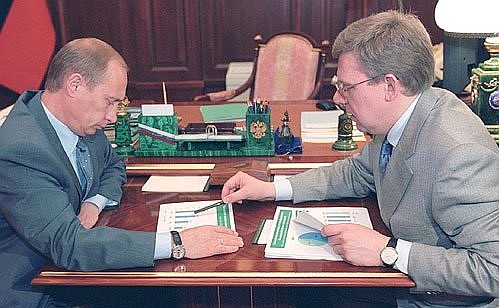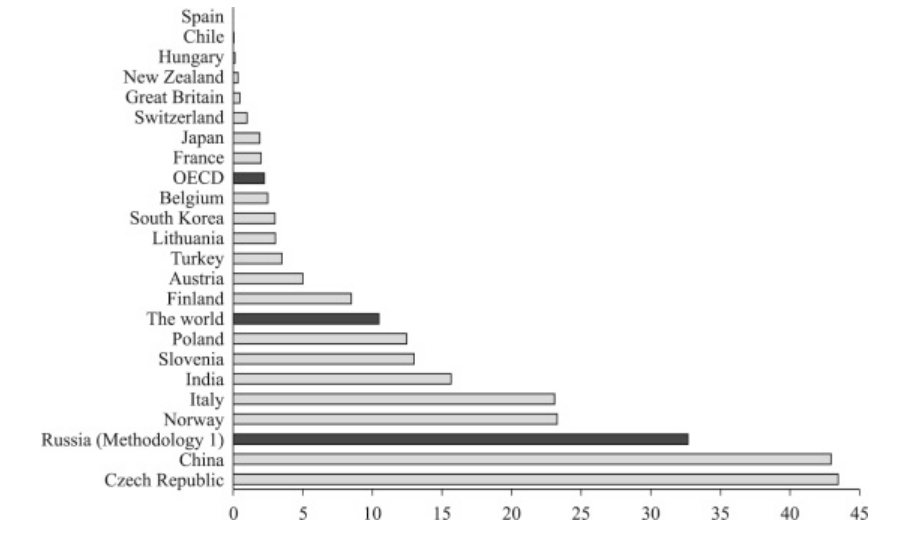On December 10 Russian website www.ridus.ru published an article entitled: Kudrin: Russia can expect the fate of the USSR
Alexei Kudrin, current head of the Audit Chamber and Minister of Finance from May 2000 to September 2011, is one of those who are equally admired by Putin and his opposition. The article starts with the shocking Kudrin’s statement that Russia may fall apart exactly the same way as the USSR did in case if “the Russian leadership will not get rid of the Soviet mentality.”
In the next paragraph article states that Kudrin “named oil dependency, sanctions, restricting access to technology, labor shortages, and low labor productivity among the risk factors.”
Surprisingly, the article was immediately reprinted by several popular Russian websites including one of the biggest Russian web portals Rambler.ru
Kudrin’s words are not news. Most representatives of Putin’s opposition tell the same for years. It is known that Kudrin always shared this opinion, but Putin, who values Kudrin’s work in the government, nevertheless showed no signs of desire to change his basic political actions. And of course government controlled media never advertised ideas opposed to Putin’s politics.
In May 2018 Reuters wrote:
“Kudrin, who worked with Putin in the St Petersburg Mayor’s Office in the 1990s, left the government in 2011 after a dispute with then President Dmitry Medvedev.
“Two years ago, Putin asked Kudrin to head up a think tank, the Centre for Strategic Research, to devise a reform strategy for his 2018-2024 term. Putin has already picked up on some of Kudrin’s proposals, such as increasing financing for healthcare, education and infrastructure.
“Until recently, Western and Russian media had linked Kudrin to a possible role as deputy head of the presidential administration with broad economic powers. But Kudrin said he was not given a choice of roles and that the job he had decided to accept was equivalent in status to that of a first deputy prime minister.”
So, why now, Kudrin’s unorthodox ideas were presented so energetically by Russian media?
It’s necessary to say, that though the main Kudrin idea was used in the title of the ridus.ru article, the biggest part of the article was presenting the opinions of those who disagreed with him.
The article quoted Valery Mironov, chief economist at the Center for Economic Research, Development Center, Higher School of Economics University, who said:
“The difference lies in the fact that the Soviet economy was planned, command-administrative and, therefore, non-adaptive. There was a fixed exchange rate of the ruble, there was no free labor market, no private entrepreneurship.
“In addition, ideological dogmas dominated the USSR until the very last years of its existence, and the very “Soviet mentality” that Kudrin mentioned was that if real life contradicts ideological attitudes, so much the worse for the real life.”
Mironov believes that in modern Russia, there are no factors that made the Soviet economy vulnerable to challenges, both external and internal.
“The Russian leadership hopes that the future of Russiawill be different from the fate of the USSR. This hope is based on the fact that the source of funds for the modern Russian economy is private business,”he says.
Of course, Mironov agrees, the Russians will have to constantly tighten their belts, accept the continuous devaluation of ruble. However, this is the price that Russians will have to pay to safeguard the state under the conditions of its complete isolation from the outside world.
Another of Kudrin’s opponent quoted in the ridus.ru article is the HSE professor Andrei Zaostrovtsev.
He believes that the USSR collapsed due to predominantly non-economic reasons.
He states:
“The Soviet Union and other socialist multiethnic countries modeled after the Soviet Union’s economy, Yugoslavia, and Czechoslovakia, began to crumble in the first place because of interethnic problems when the leadership of these countries for various reasons removed the hard federal government’s control from the public processes. Economic difficulties have only become a catalyst for these processes.”
The threat to the unity of Russia stems from approximately the same reasons, the expert fears.
“There are territories within the Russian Federation that belong to it only formally, but not economically, ethnically and mentally in any way. First of all, there is Chechnya, but there are a number of other regions that are de facto sovereign, albeit not officially. They do not consider themselves to be part of Russia, and beyond their borders, they are also not perceived as Russian territories. They remain in the Russian Federation as long as they are firmly held in the federation by Moscow,” says Zaostrovtsev.
In his opinion, if the government will remove powerful “vertical” control of all the territories,the parade of sovereignties will become a reality, as it happened in the USSR for the same reason.
It’s possible that the ridus.ru article was published and republished by many in order to disprove the ideas delivered by Kudrin, as these ideas becoming more and more popular in Russia.
Do Kudrin’s opponents propose to strengthen “vertical power” in order to save Russia from disintegration? Isn’t this idea a perfect example of “Soviet mentality”? “Vertical power” was the basic principle of the USSR, but it didn’t save it from the collapse. Soviet leaders “removed the critical media from public processes”, for one reason: “vertical power” didn’t work any longer.
As for the “free private economy”, so “different from the Soviet economy”, as Mironov claims, it is interesting to look at the diagram showing the percentage of participation of state owned enterprises [SOEs] in the economy of different countries:
Share of SOEs in total market capitalization for various countries, 2012 (%).
Share of SOEs in total market capitalization for various countries, 2012 (%).



